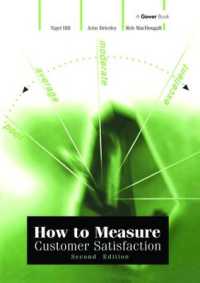- ホーム
- > 洋書
- > 英文書
- > Politics / International Relations
Full Description
A History of Modern Political Thought in East Central Europe is a two-volume project, authored by an international team of researchers, and offering the first-ever synthetic overview of the history of modern political thought in East Central Europe. Covering twenty national cultures and languages, the ensuing work goes beyond the conventional nation-centered narrative and offers a novel vision especially sensitive to the cross-cultural entanglement of discourses. Devising a regional perspective, the authors avoid projecting the Western European analytical and conceptual schemes on the whole continent, and develop instead new concepts, patterns of periodization and interpretative models. At the same time, they also reject the self-enclosing Eastern or Central European regionalist narratives and instead emphasize the multifarious dialogue of the region with the rest of the world. Along these lines, the two volumes are intended to make these cultures available for the global 'market of ideas' and also help rethinking some of the basic assumptions about the history of modern political thought, and modernity as such.
The first volume deals with the period ranging from the Late Enlightenment to the First World War. It is structured along four broader chronological and thematic units: Enlightenment reformism, Romanticism and the national revivals, late nineteenth-century institutionalization of the national and state-building projects, and the new ideologies of the fin-de-siècle facing the rise of mass politics. Along these lines, the authors trace the continuities and ruptures of political discourses. They focus especially on the ways East Central European political thinkers sought to bridge the gap between the idealized Western type of modernity and their own societies challenged by overlapping national projects, social and cultural fragmentation, and the lack of institutional continuity.
Contents
Introduction
I. The Discovery of Modernity: Enlightened Statecraft, Discourses of Reform, and Civilizational Narratives
1: The Politics of Improvement: European Models and Local Traditions
2: National Projects and Civilizational Hierarchies
3: The Repercussions of the French Revolution and the Napoleonic Wars
II. Spiritualizing Modernity: The Romantic Framework of Political Ideas
4: "Playing the Piano that Does Not Yet Have Strings?" The Cultural-Political Programs of the "National Revivals"
5: Political Visions of the Vormärz
6: Brotherhood and Disappointment: 1848 and its Aftermath
III. Institutionalizing Modernity: Conceptions of State-Building and Nation-Building in the Second Half of the Nineteenth Century
7: The Interplay of National and Imperial Principles of Organization
8: The Political Implications of Positivism
9: The Rise and Fall of "National Liberalism" after 1848
IV. Taming Modernity: The Fin de Siècle and the Rise of Mass Politics
10: Liberals, Conservatives and Mass Politics
11: The Left and the Ambiguity of the Marxist Package
12: Coping with Diversity
13: The Faces of Modernity
14: The Great War








